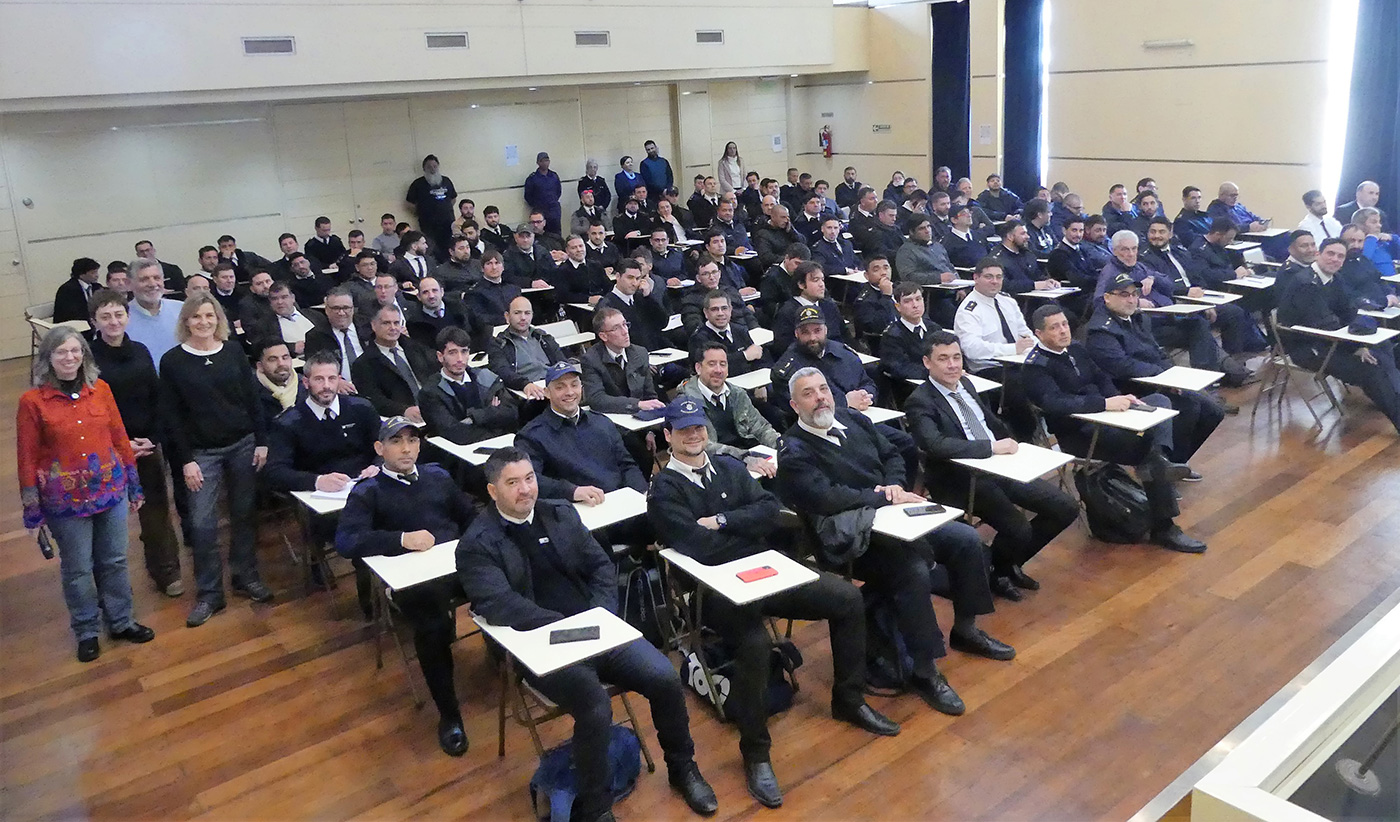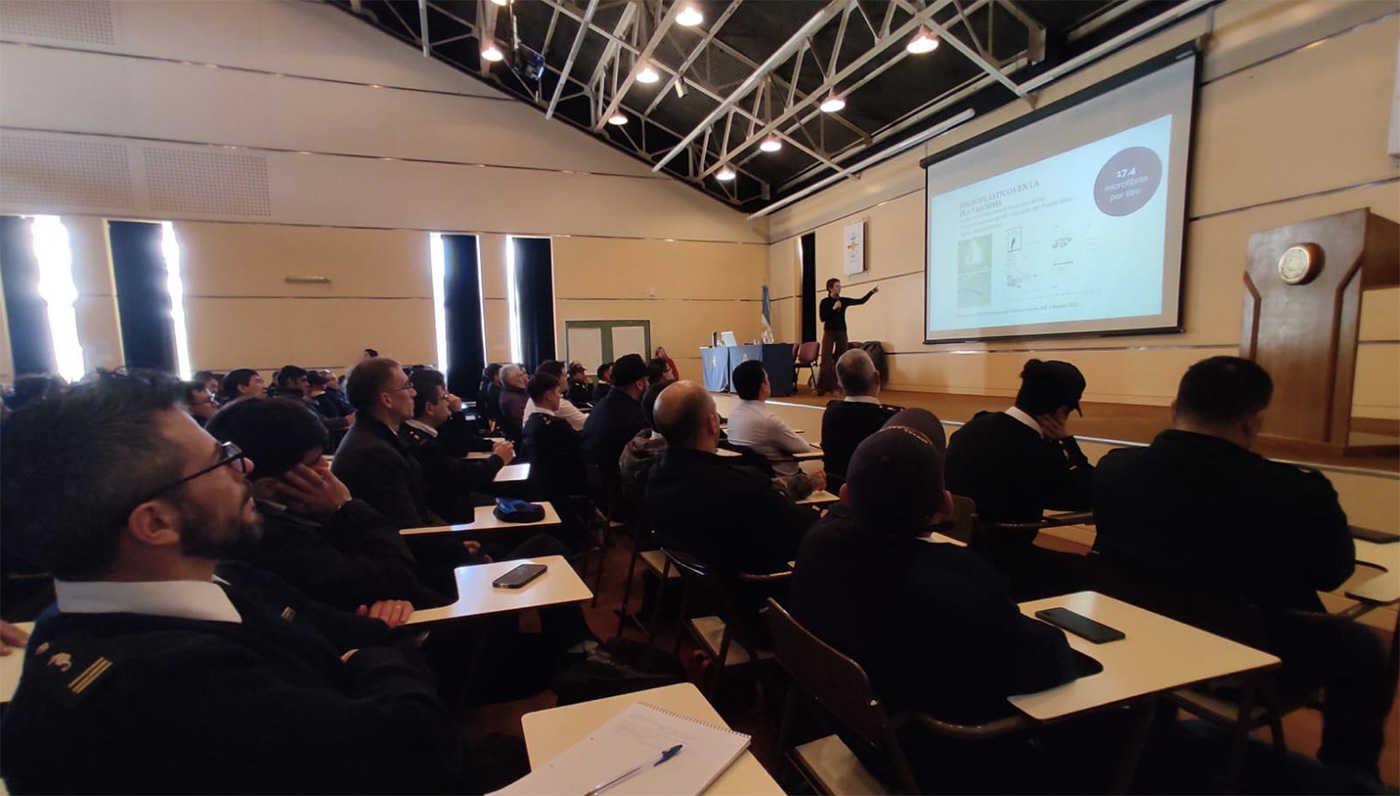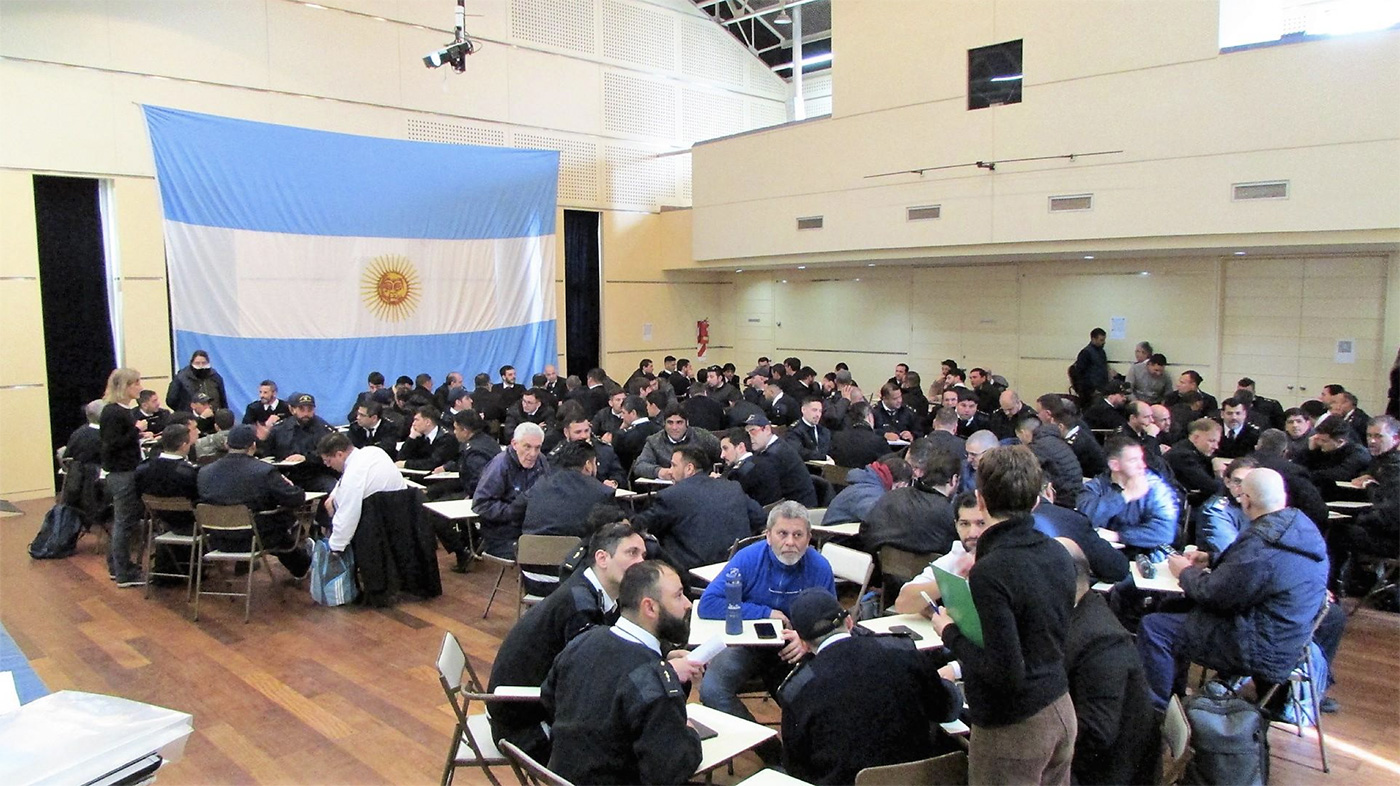
Three organizations that are part of the Forum and participate in the Project – Fundación Cambio Democrático, Fundación Vida Silvestre Argentina and Instituto de Conservación de Ballenas – led this training initiative, which was developed as part of the activities that the National Fishing School – which depends on the Argentine Navy – carries out to promote an ecosystemic approach to fishing activities.
In general terms, this approach aims at planning, managing and developing fisheries in order to address multiple social needs and aspirations, without jeopardizing the possibility for future generations to benefit from the wide range of goods and services derived from marine ecosystems (FAO).
The activity, which was attended by more than 120 people, including captains, sailors, machinists and personnel with a long history of marine fishing activities, was aimed at capacity building to promote the adoption of good practices for the management of plastics and other waste on vessels and in ports. Verónica García from Fundación Vida Silvestre Argentina (FVS), Roxana Schteinbarg from the Instituto de Conservación de Ballenas (ICB) and Diego González Zevallos from Centro Científico Tecnológico Patagónico (CCT CONICET CENPAT) were the main speakers of the day, They were joined by members of the Project team, with the facilitation of Alexandra Sapoznikow of the Fundación Cambio Democrático (FCD).
Rafael Guiñazu, Secretary of Extension and Liaison at the National Fishing School, highlighted the importance of the joint work carried out with the organizations that make up the Forum in “raising awareness among officers and captains, who are the ones who will then have to provide training and establish conduct on the proper management of waste on ships”. In addition, he pointed out that “in 2024 a curricular modification will be made in the plan of this School to incorporate this approach in the training of Fishing Captains”.
Alexandra Sapoznikow, from FCD, said: “The meeting was an opportunity for the fisheries officers and the organizations implementing the project to exchange knowledge about the problem of fishing plastics at sea. Through a fluid dialogue, we were able to understand the main causes of fishing-related loss of plastic elements at sea, and to find opportunities to work together to improve the management of plastic waste on board and in port”.

In search of participatory solutions
Verónica García, specialist in Marine Ecosystems and Sustainable Fisheries at Fundación Vida Silvestre, pointed out during her presentation that: “We consider it very important to dialogue with the personnel who usually work on board the vessels to understand the causes of the great accumulation of plastics of fishing origin on the Patagonian coasts and to articulate efforts to find a solution”, she said.
García emphasized that, according to the data obtained in the censuses carried out by Fundación Patagonia Natural in 2007 and those collected in 2022 together with Chubut’s Waste Technical Board, it was detected that many of the Patagonian coasts have levels of plastic waste from fishing origin well above the percentage estimated for this type of waste worldwide”.
For Roxana Schteinbarg, co-founder of ICB, solving the problem of plastic pollution in the sea requires a combination of multiple strategies. She emphasized the importance of moving from a linear to a circular economy system, highlighting the role of good practices and proper waste management to prevent plastic materials used by the fishing industry from becoming waste and impacting the marine ecosystem.
In relation to this, Schteinbarg pointed out that “it is key to address the problem at sea as well as at home and in everyday life. That is why it is important to dialogue with those who spend a large part of their lives on board to detect the necessary actions to properly manage waste on board and prevent it from falling into the water and impacting the health of the sea and the species that inhabit it, many of which are essential for fishing activities”.

Regarding waste management on ships, Diego González Zevallos said that “the port area is a key interface, because even if fishing vessels return to port with 100% of their classified waste, port facilities are not prepared to receive and manage it. Returning with all the waste in the vessel and maintaining the habit of sorting it on board is essential for good port management. In this sense, he emphasized that the contents of the course presented “go beyond a training tool for the fishing sector, including also the general public”.
Effective measures
At the end of the presentations, the participants worked in groups to identify the main plastic materials that fall into the sea during fishing activities, what are the critical moments and what prevention actions can be carried out.
The workshop is part of the activities that, over the course of three years, the Forum organizations participating in the project “Strengthening the Resilience of Argentina’s Marine Protected Areas” plan to carry out with the support of the European Union.
The strengthening of this collaborative work with the National Fishing School is essential to raise awareness among those who operate in the marine environment on the proper management of waste on ships, strengthen their capacities and promote effective measures to reduce negative impacts on Marine Protected Areas and the coastal-marine environment as a whole.
About the “Strengthening the Resilience of Argentina’s Marine Protected Areas” Project:
The objective of this project is to promote actions aimed at ensuring that the ecosystems of the Argentine Sea maintain the integrity of their biodiversity with measures aimed at facilitating their capacity for adaptation and mitigation in the face of climate change, and contributing to the health and well-being of people.
The Project is coordinated by the Forum for the Conservation of the Patagonian Sea and Areas of Influence, and implemented by eight of its member organizations:


These organizations seek, through articulation and participation, to generate a better understanding of the problem of marine pollution by plastics from fishing operations on the biodiversity of the Patagonian Sea and thus promote comprehensive and sustainable solutions to prevent it, in order to protect and conserve the marine ecosystems of Argentina.